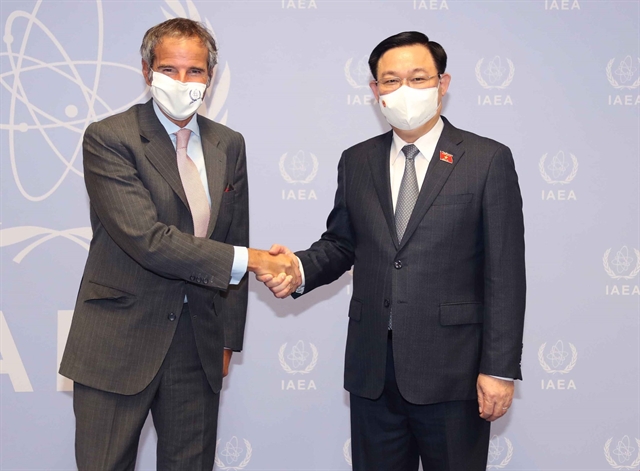 Politics & Law
Politics & Law

National Assembly (NA) Chairman Vương Đình Huệ on Monday had a meeting with Director General of the International Atomic Energy Agency (IAEA) Rafael Mariano Grossi as part of activities during his trip to Austria to attend the fifth World Conference of Speakers of Parliament (WCSP5).

|
| National Assembly (NA) Chairman Vương Đình Huệ on Monday meets with Director General of the International Atomic Energy Agency (IAEA) Rafael Mariano Grossi in Vienna, Austria. — VNA/VNS Photo Doãn Tuấn |
HÀ NỘI — National Assembly (NA) Chairman Vương Đình Huệ on Monday had a meeting with Director General of the International Atomic Energy Agency (IAEA) Rafael Mariano Grossi as part of activities during his trip to Austria to attend the fifth World Conference of Speakers of Parliament (WCSP5).
During the meeting, Grossi thanked Việt Nam for its active contributions to his agency, including a commitment to helping complete the second phase of a modern laboratory to enhance the IAEA’s capacity in supporting countries combating infectious diseases.
In addition to non-proliferation of nuclear weapons, the agency is carrying out other activities to support countries, including Việt Nam, in cancer treatment, water management, and COVID-19 response.
The IAEA official welcomed Việt Nam's candidacy for the IAEA Board of Governors for the 2021-2023 term, affirming that Việt Nam is an important partner of the agency.
He expressed his hope that Việt Nam would continue its contributions to the IAEA in the future.
NA Chairman Huệ highly valued the role played by the IAEA in and its contributions to promoting the application of atomic energy in solving global problems, scientific and technical cooperation in the nuclear field for peaceful purposes and development, and ensuring safety and security in this field.
He said the IAEA had effectively supported its member countries affected by the COVID-19 pandemic through sharing knowledge, assisting medical experts in radiation medicine and therapy, nuclear medicine, diagnostic imaging, and training in genetic sequencing to characterise the virus that causes COVID-19.
The top Vietnamese legislator congratulated the IAEA on completing the first phase of a modern laboratory named Yukiya Amano to improve its capacity of assisting countries in fighting and preventing transboundary zoonotic diseases, and addressing challenges related to climate change and food safety, affirming that Việt Nam would give financial contribution to the second phase of this important project.
Huệ welcomed the IAEA's cooperation initiatives with UN agencies to promote the application of nuclear science in climate change response, health, agriculture, as well as in clean energy transition and promoting nuclear safety and security.
He suggested the agency share experience and provide technical assistance for Việt Nam to perfect its legal system to effectively manage and apply atomic energy in promoting economic development, protecting the environment and combating climate change.
He also asked for the IAEA’s assistance and cooperation with Việt Nam in technology transfer, training and improving capacity in applying nuclear technology in health and COVID-19 prevention and control, expressing his hope that the agency would support Việt Nam to participate in its important initiatives, including the IAEA Zoonotic Disease Integrated Action (ZODIAC) project, especially activities of the Working Group on Science and Technology (WGST) of the Inter-Parliamentary Union (IPU).
IAEA Director General Grossi took the occasion to announce that his agency would provide Việt Nam with three mobile real-time PCR systems and a large number of biological products worth 470,000 EUR (US$558,000).
These devices were researched and developed by the IAEA on the basis of application of nuclear technology for accurate diagnosis and early detection of different viruses.
NA Chairman Huệ appreciated the IAEA's gifts, saying that they would effectively support Việt Nam in responding to the COVID-19 pandemic.— VNS




